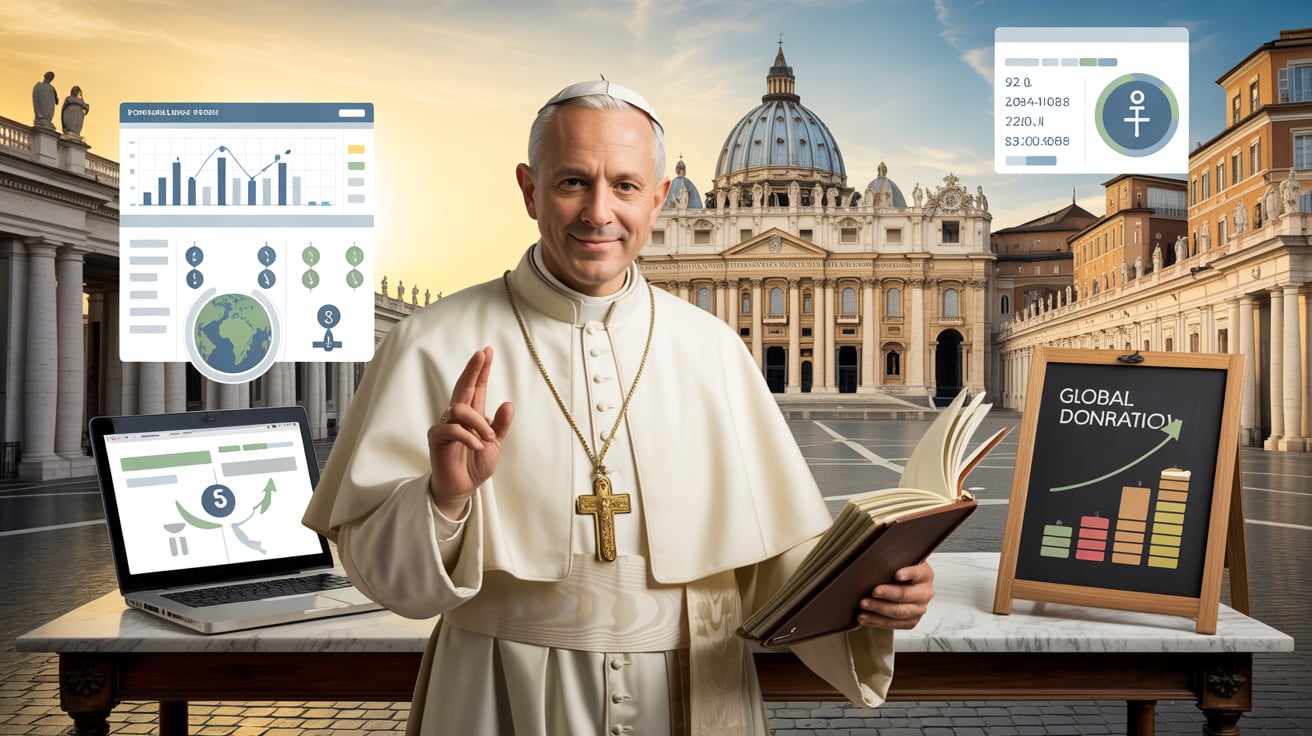VATICAN CITY — Before becoming Pope Leo XIV, Robert Prevost was the kind of bishop who rolled up his sleeves—literally. While serving in Peru, he scoured second-hand markets for cheap, broken-down cars, watching YouTube tutorials to learn how to fix them himself for parish use. That resourceful, hands-on approach might just be the mindset needed as he now faces one of the Catholic Church’s most urgent crises: its crumbling financial foundation.
As the leader of the 1.4-billion-member Roman Catholic Church, Leo XIV inherits a troubling fiscal legacy. The Vatican is struggling under a €50–60 million ($57–68 million) annual deficit, a staggering €1 billion ($1.14 billion) pension shortfall, and declining global donations. These challenges threaten the sustainability of the Holy See’s operations, and the question looms: Can an American pope use U.S.-style fundraising savvy and financial transparency to clean up the Vatican’s books?

A Pope Who Understands the Numbers
Leo XIV isn’t your typical career cleric. Born in Chicago, he studied mathematics before entering the priesthood, and served twice as the global head of the Augustinian order. He is fluent in canon law, but also comfortable reading a balance sheet—skills that give him an edge in navigating the Vatican’s notoriously opaque financial system.
More importantly, his American background may be his biggest asset. The U.S. remains the Vatican’s most generous donor base, with individuals and institutions contributing millions annually to papal charities and restorations. That donor trust, however, has frayed after years of financial mismanagement scandals, high-profile corruption trials, and a pervasive lack of transparency in Vatican spending.
But Leo’s election has renewed hope among U.S. Catholics. “The election of an American is going to give greater confidence that any money given is going to be cared for by American principles—especially stewardship and transparency,” said Rev. Roger Landry, director of the Pontifical Mission Societies in the U.S.
Rebuilding Trust After Scandal
Much of the damage began before Leo’s time, but it’s now his to repair. Under Pope Francis, the Vatican launched several ambitious reforms. He created a new economy ministry, forced financial departments to follow international standards, and held a groundbreaking corruption trial over a failed €350 million London real estate deal.
Yet critics argue that reforms were uneven, incomplete, and sometimes undermined from within. Francis dismissed the Vatican’s first-ever auditor general amid controversy and left the Holy See with a deficit of €83.5 million ($95 million) in 2023, according to the latest financial statements.
Even more concerning: despite having been stripped of its financial autonomy following the London fiasco, the Secretariat of State now leads a new Vatican fundraising commission. Composed entirely of Italian officials with no external oversight or fundraising experience, the commission has sparked criticism for its lack of diversity and transparency.
“There are no Americans on the commission,” noted Ward Fitzgerald, president of the U.S.-based Papal Foundation, which has given over $250 million to papal projects since 1990. “American donors, especially younger ones, demand accountability. Without transparency, they’ll look elsewhere.”
A Track Record of Fundraising and Fiscal Discipline
Leo XIV’s career suggests he might just be the right person to steer the ship. As bishop of Chiclayo, Peru, he led several high-impact fundraising initiatives. During the COVID-19 crisis, he raised enough funds to build two oxygen plants to aid overwhelmed hospitals. When floods devastated the region, he was filmed wearing rubber boots in knee-deep water, launching a campaign called “Peru Give a Hand.”
His support for local Caritas efforts transformed parish food banks into vital lifelines, working with businesses to feed the poor. He even found donors willing to supply live chickens for Venezuelan refugees. Such on-the-ground leadership earned him both local respect and donor trust.
“His approach was very pragmatic. He knows how to get things done,” said Rev. Jorge Millán, a priest who lived with Leo in Peru. “If he didn’t know how to fix something, he’d figure it out on YouTube.”
That DIY ethic extended to financial oversight. As prior general of the Augustinians, he reviewed global budgets, investments, and helped launch a foundation—Augustinians in the World—to support self-sustaining projects in Africa. By 2023, the foundation had nearly €1 million in assets and was funding programs such as a rehabilitation center for former child soldiers in Congo.
Rev. Franz Klein, the order’s economist in Rome, praised Leo’s financial instincts. “He has a very good feeling for numbers,” said Klein. “I have no worry about the Vatican’s finances in these years because he is very, very clever.”
The American Advantage
In many ways, Leo XIV’s American roots may prove to be his strongest card. U.S. Catholic donors are already more familiar with nonprofit accountability models and prefer project-based giving. Under Pope Francis, overall donations dipped globally, but American generosity largely held steady.

That trend could intensify under Leo’s leadership—if he can demonstrate that their money is well spent. In the words of Fitzgerald from the Papal Foundation, “We would expect transparency before we would start to solve the problem.”
Moreover, Leo’s example of boots-on-the-ground leadership stands in contrast to the Vatican’s entrenched bureaucracy. Whether he can bring that same level of reform to Rome remains to be seen, especially as power struggles and legacy structures push back against change.
The Road Ahead
The Vatican doesn’t need miracles—it needs financial clarity, strategic reforms, and renewed faith in its management. With a math-minded, hands-on American at the helm, there’s hope that a new chapter is beginning.
But success will depend on whether Pope Leo XIV can overcome decades of institutional inertia, push through stalled reforms, and deliver on his promise not just to inspire Catholics spiritually, but to reassure them financially.
Conclusion:
Pope Leo XIV steps into the papacy at a critical financial crossroads for the Vatican. With a background that combines American practicality, deep fiscal understanding, and a proven record of grassroots fundraising, he brings a rare blend of spiritual leadership and economic sensibility. His election has already reenergized U.S. donors and sparked cautious optimism among Catholic philanthropists who have long demanded transparency, accountability, and reform.
Yet the path ahead is steep. Decades of scandal, entrenched Vatican bureaucracy, and a persistent budget deficit won’t be easy to fix. But if Leo can apply the same resourceful, no-nonsense approach he used in Peru—and pair it with the values of American-style stewardship—he may finally bring lasting change to the Holy See’s troubled finances. In doing so, he won’t just restore faith in Vatican management—he may redefine how the Church engages with its global supporters in the 21st century.




One thought on “Could an American Pope Bring U.S.-Style Fundraising and Financial Standards to Reform Vatican Finances?”